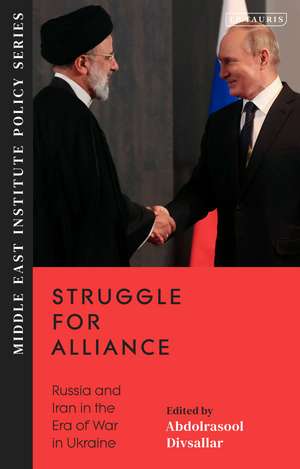Struggle for Alliance: Russia and Iran in the Era of War in Ukraine: Middle East Institute Policy Series
Editat de Abdolrasool Divsallaren Limba Engleză Paperback – 24 iul 2024
| Toate formatele și edițiile | Preț | Express |
|---|---|---|
| Paperback (1) | 136.98 lei 3-5 săpt. | +29.98 lei 4-10 zile |
| Bloomsbury Publishing – 24 iul 2024 | 136.98 lei 3-5 săpt. | +29.98 lei 4-10 zile |
| Hardback (1) | 408.75 lei 3-5 săpt. | +51.39 lei 4-10 zile |
| Bloomsbury Publishing – 24 iul 2024 | 408.75 lei 3-5 săpt. | +51.39 lei 4-10 zile |
Preț: 136.98 lei
Preț vechi: 146.79 lei
-7% Nou
Puncte Express: 205
Preț estimativ în valută:
26.21€ • 27.44$ • 21.82£
26.21€ • 27.44$ • 21.82£
Carte disponibilă
Livrare economică 10-24 martie
Livrare express 21-27 februarie pentru 39.97 lei
Preluare comenzi: 021 569.72.76
Specificații
ISBN-13: 9780755653508
ISBN-10: 0755653505
Pagini: 272
Dimensiuni: 138 x 216 x 21 mm
Greutate: 0.49 kg
Editura: Bloomsbury Publishing
Colecția I.B.Tauris
Seria Middle East Institute Policy Series
Locul publicării:London, United Kingdom
ISBN-10: 0755653505
Pagini: 272
Dimensiuni: 138 x 216 x 21 mm
Greutate: 0.49 kg
Editura: Bloomsbury Publishing
Colecția I.B.Tauris
Seria Middle East Institute Policy Series
Locul publicării:London, United Kingdom
Caracteristici
In an increasingly polarized geopolitical moment, this book highlights emerging cooperation between these nations in military aid, sanction evasion, internal security, and non-Western multilateral frameworks
Notă biografică
Abdolrasool Divsallar is a Visiting Professor at the Universita' Cattolica del Sacro Cuore in Milan, Italy, and a senior researcher at the UN Institute for Disarmament Research (UNIDIR). He is also a Non-Resident Scholar at the Middle East Institute in Washington D.C, USA. He co-founded and led the Regional Security Initiative at the European University Institute from 2020-22. Dr. Divsallar's focus and interests include Russia-Iran relations, military strategies in the Persian Gulf, Iran's military and foreign affairs, regional security reform, non-proliferation issues, and security assistance. He has written and edited eight books, including Stepping Away From the Abyss: A Gradual Approach Towards a New Security System in the Persian Gulf (2021), and has published numerous peer review journal articles.
Cuprins
Introduction: What Makes a New Study Needed?Abdolrasool Divsallar Part 1 - Domestic Debates: Between State enthusiasm and public uncertaintyChapter 1. Iran's Ascent in Russian Foreign Policy Thinking: The Emergence of a New ParadigmNicole Grajewski, Postdoctoral Fellow with the Belfer Center at Harvard's Kennedy SchoolChapter 2. The Ukraine War and Internal Debates in IranMahmood Shoori, Deputy Director of the Institute for Iran & Eurasia StudiesChapter 3. Identity, Statehood, and Strategic SympathyDianna Galeeva, Visiting Fellow at Oxford Centre for Islamic StudiesPart 2 - Systemic ConstraintsChapter 4. Russian Policy in the MENA and Mediterranean Regions: Implications for Iran Mark N. Katz, Professor of Government and Politics at the George Mason University Schar School of Policy and GovernmentChapter 5. The Principle of Strategic Stability: Russia's Nuclear Policy Towards Iran Anastasia Malygina, Associate Professor at the School of International Relations at St. Petersburg State UniversityPart 3 - A Hybrid Status: Competition amid Cooperation Chapter 6. Anti-Americanism and a Dream of Non-Western OrderJeffrey Mankoff, Distinguished Research Fellow at the U.S. National Defense University's Institute for National Strategic Studies Mahsa Rouhi, Research Fellow at the U.S. National Defense University's Institute for National Strategic StudiesChapter 7. Countering Sanctions: New Economic and Trade ProspectsEsfandyar Batmanghelidj, Founder and CEO, the Bourse & Bazaar Foundation Chapter 8. Why Russian Energy Interests Cannot Match Iranian OnesJakub M. Godzimirski, Research Professor at the Norwegian Institute of International AffairsChapter 9. How the War in Ukraine Changes Russia and Iran's Posture in Syria and the Eastern Mediterranean Hamidreza Azizi, Visiting Fellow at the German Institute for International and Security Affairs (SWP) Part 4 - The Future of relationsChapter 10. Is An Authoritarian Alliance Emerging?Abdolrasool Divsallar ConclusionAbdolrasool Divsallar





